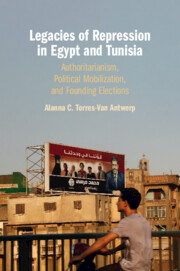 Legacies of Repression in Egypt and Tunisia
Legacies of Repression in Egypt and Tunisia from Part II - Phoenix from the Ashes
Published online by Cambridge University Press: 10 March 2022
Chapter 4 begins with an in-depth process tracing of the decisions around political party formation in Egypt after Mubarak’s ouster. We revisit the puzzling variation in party formation across the Egyptian political opposition landscape, particularly examining the decision on the part of Egyptian organized labor and pro-reform activist groups not to form political parties, tracing the link between the structure of the opposition under the Mubarak regime to the strategic incentives and organizational constraints faced by groups at this juncture. We then conduct an in-depth within-case comparison of the mobilization prior to Egypt’s 2011 elections, utilizing granular data on political parties’ specific campaign strategies and methods to trace the link between the adaptations that various groups made during the Mubarak era to the relative organizational and persuasive resources political groups had, and the mobilization tactics and strategies they were then able to use. We also specifically examine compelling evidence for common alternatives or contributing explanations for the Muslim Brotherhood’s success, and show that while these explanations certainly fill in part of the picture, they are incomplete without an understanding of mechanisms linking authoritarian legacies to the 2011 elections.
To save this book to your Kindle, first ensure [email protected] is added to your Approved Personal Document E-mail List under your Personal Document Settings on the Manage Your Content and Devices page of your Amazon account. Then enter the ‘name’ part of your Kindle email address below. Find out more about saving to your Kindle.
Note you can select to save to either the @free.kindle.com or @kindle.com variations. ‘@free.kindle.com’ emails are free but can only be saved to your device when it is connected to wi-fi. ‘@kindle.com’ emails can be delivered even when you are not connected to wi-fi, but note that service fees apply.
Find out more about the Kindle Personal Document Service.
To save content items to your account, please confirm that you agree to abide by our usage policies. If this is the first time you use this feature, you will be asked to authorise Cambridge Core to connect with your account. Find out more about saving content to Dropbox.
To save content items to your account, please confirm that you agree to abide by our usage policies. If this is the first time you use this feature, you will be asked to authorise Cambridge Core to connect with your account. Find out more about saving content to Google Drive.